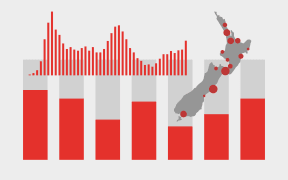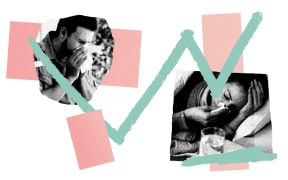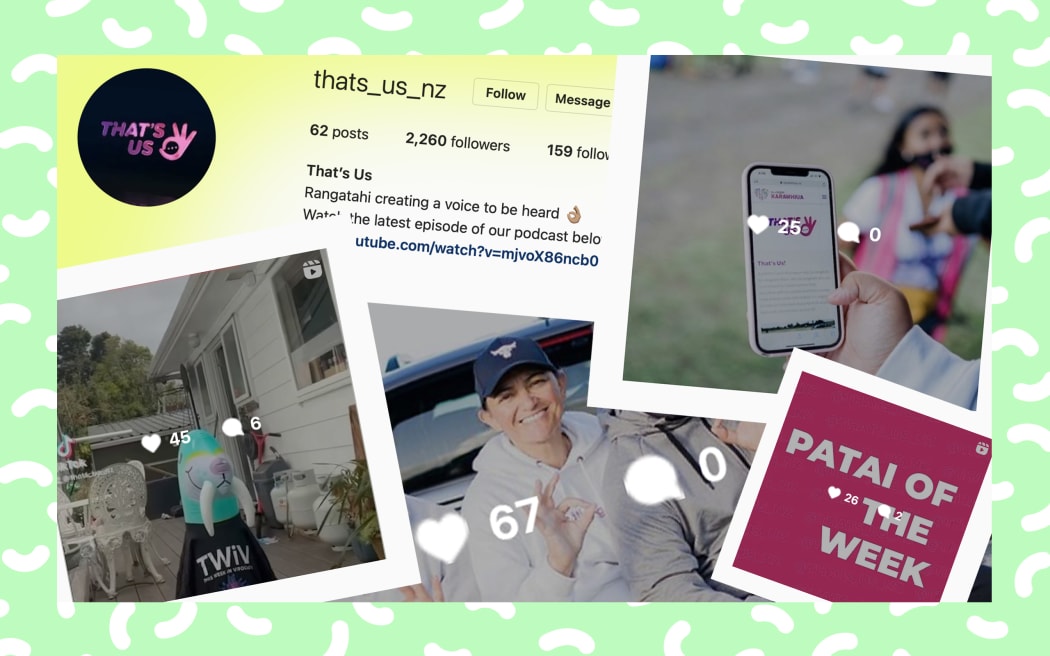
Photo: RNZ
In the rush to increase Covid-19 vaccination rates, the government gave a lot of money in a short space of time to social media marketing campaigns it hoped might help. One scheme that got $1.59m seems to have come up short. Anusha Bradley investigates.
A little kid runs up to a blue inflatable walrus and deftly knocks it over. It bounces back up briefly before a slightly bigger kid runs up and strikes it with a quick one-two punch combination. Lastly, an adult races up to the inflatable, tackles and punches it furiously, until it stays limp on the ground.
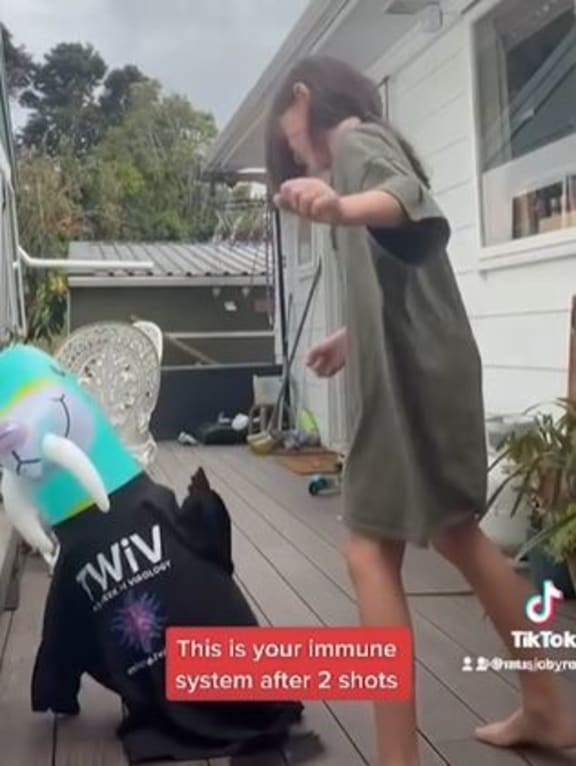
Photo: Instagram/thats_us_nz
The inflatable in this Instagram video is supposed to represent the Covid-19 virus. The people, the immune system strengthened by the Pfizer vaccine. But some are confused.
"Is this supposed to be funny?" a comment on the post asks.
"The punching in the face as [sic] vaccination metaphor isn't great though… Especially to a community that's already had misinformation," says another.
"I thought it was an anti-vax video," says a third.
"Yeah the vaccine does f… it up a bit eh," chimes in a fourth.
The account responsible for the post has other videos that seem to be similarly missing their mark.
One, called "Get Vaxed, not Big Macs", featuring Dr Ashley Bloomfield is published via Instagram in May. Months later, it has 145 likes and comments such as: "Dumbest video ever"; and "Really? So cringe".
Another, posted on TikTok and Instagram the same month, showing what appears to be an evangelical preacher, attracts more criticism.
"Unbelievably terrible ads on YouTube. I've seen them at least 50 times and still have no idea what they are about. Who's paying for this?"
Someone replies: "The government [sic] bro, I wish I was joking."
It's no joke.
The videos are part of a Ministry of Health funded $1.59m nationwide campaign aimed at lifting vaccination rates among young Māori by 20 percent, at a time when they were one of the least vaccinated groups in the country.
But an RNZ investigation has found delays, poor content and a fallout among the rangatahi hired to run it resulted in the campaign falling short of its promise. By the time it finally kicked off in earnest with a big budget to promote the posts in February 2022, it was too late. Nearly 90 percent of rangatahi already have their first dose of the vaccine and over 80 percent are fully vaccinated.
Three months later, a senior marketing executive in charge of the campaign at Te Hiringa Hauora/Health Promotion Agency (THH) was under investigation for potential conflicts of interest, and questions were being asked in Parliament about how the campaign was managed and what it actually achieved.
Earlier this month, the story reached a climax - of sorts - with the resignation of that senior marketing executive from Health NZ.
The pitch
It's September 2021 and the Delta variant of Covid-19 is surging around the country. The government is shifting away from its elimination strategy in favour of living with the virus. The move creates significant alarm at the low rates of Covid-19 vaccination among young Māori.
Less than 40 percent of Māori aged 12 to 29 have received a first dose of the Pfizer vaccine, compared to around 70 percent of the wider population.
Disinformation about the vaccine is rife and trust in the government among young Māori is low. The government is looking for solutions, fast.
The Ministry of Health receives a joint pitch from Te Puni Kōkiri, Te Hiringa Hauora/Health Promotion Agency (THH), the Iwi Comms Collective and Ngati Rangatahi - a group of 40 Māori youth - to run a national $1.5m social media campaign.
"The all of government campaign, Unite Against Covid-19, has not been successful in capturing rangatahi, and indeed many government campaigns struggle to engage well with this audience," a strategy document states.
"Accelerating vaccination uptake amongst reluctant communities is now critically urgent."
The solution? A social media campaign "for rangatahi, by rangatahi" targeting Māori aged 17 to 25.
This age group is wary of being told what to do, especially by a government agency. The "pro-vaccination" message will be delivered in the campaign "by stealth", with humour and "driven by insights" gathered from Ngāti Rangatahi and supported by the Iwi Communications Collective and THH, who will provide marketing and budgeting expertise.
The campaign is called 'That's Us'. It aims to build on Te Puni Kōkiri's successful Karawhuia vaccination campaign aimed at the general Māori population.
"We aim to increase vaccination rates by 20 percent for rangatahi Māori," the 'That's Us' strategy states.
The ministry is sold. It indicates a contract will be drawn up and the group swings into action.
It's one of the biggest social media campaign budgets ever managed by THH and will be led by its general manager of communications, digital and marketing, Debra Jensen. Her partner, Jason Ake, is also involved in the project as the chair of the Iwi Communications Collective. Ake is also the general manager of communications and engagement at Waikato Tainui.
Among the 'That's Us' team is Jensen's nephew and his partner, who were living with Jensen and Ake at the time. The pair are among a core group of 10 rangatahi contracted by THH to work on the campaign. The nephew, Tauawhi Bonilla, asks for $10,000 upon signing a formal contract for his role as co-lead to recognise the work he's done to get the campaign off the ground so far.
The campaign
While funding is approved in principle, the money from the Ministry of Health isn't forthcoming, leading the rangatahi to complain Super Saturday - a nationwide vaccination event on October 16 - is a "missed opportunity".
The ministry officially confirms the funding a few days later.
The first social media posts from the 'That's Us' campaign appear in mid-November. They announce its launch and two upcoming movie and vaccination events to be held in the small Waikato town of Ngaruawahia.
Documents show $100,000 was originally budgeted for the two events but some government stakeholders raise concerns about "$50k BBQs" being held in one of the poorest parts of the country.
In the end, $26,000 is spent on both events, including more than $16,000 on hoodies, face masks and fleece blankets to give away. A total of 121 people are vaccinated.
Of the 59 vaccinated at the first event, 18 are first doses. There are 23 people aged between 12 and 18 who get a dose.
Jensen declined to be interviewed, but in response to written questions says the two Waikato movie nights were paid for by other partners and that other movie nights were held in Tauranga, Auckland and New Plymouth, though none of these appear to have been promoted on 'That's Us' social media accounts.
The original plan is to start buying social media placements in December to correspond with the nationwide 'Two Shots for Summer' campaign.
But it doesn't pan out. The rangatahi are initially slow to produce content, and when they do it's not always to specification. Then, the entire project is brought to a halt for six weeks from late December until early February after a falling out between Bonilla, his partner and another of the rangatahi.
Jensen and Ake hold urgent hui with the trio in a bid to reconcile them, but it's without success. On Christmas Eve, a decision is made to halt all paid media placements until January 10.
There are other reasons for the hiatus too.
"This is both to allow our moderators and wider team a true break, and to protect the reputation of the 'That's Us' brand following negative feedback to these ads," a THH employee writes to the rest of the team.
Despite the break, the dispute still isn't resolved by 10 January and a rare filming opportunity with Director-General of Health Ashley Bloomfield has to be rescheduled.
Aro Media, the campaign's media buyer and consultant, continues to collect its monthly consultancy fee of $25,000 over the shutdown period.
Then, Bonilla and his partner abruptly quit the campaign on 4 February - Bonilla was always going to return to his studies and Ora got another job, Jensen says.
By the time the campaign finally kicks off in earnest with a big budget paid media campaign in mid-February, it's too late. Eighty-seven percent of rangatahi Māori (aged 12-29) have already received a first dose of Pfizer and 81 percent are fully vaccinated.
Why did it continue? Te Whatu Ora did not respond to RNZ's question, and the rangatahi either declined or did not respond to requests for comment.
Jensen says while vaccination rates for rangatahi improved over Christmas, they were still lagging for booster shots among rangatahi.
She also says it's "not uncommon" for disputes to arise in new teams. "There were numerous challenges for the campaign and Ngāti Rangatahi. The campaign's success and effectiveness therefore is a credit to their resilience."
One of the rangatahi is promoted to co-lead, replacing Bonilla. And in a bid to smooth relations between the rangatahi and improve output, a campaign manager is hired at $100 per hour to oversee their work and schedule. Despite this, concerns about the content continue to arise.
A clip published in March riffs off what seems to be a young man about to scull a bottle of beer down a hose pipe. In another, a kid mistakes "getting vaxxed" with '"Big Macs". It's against THH policies to promote alcohol or fast food.
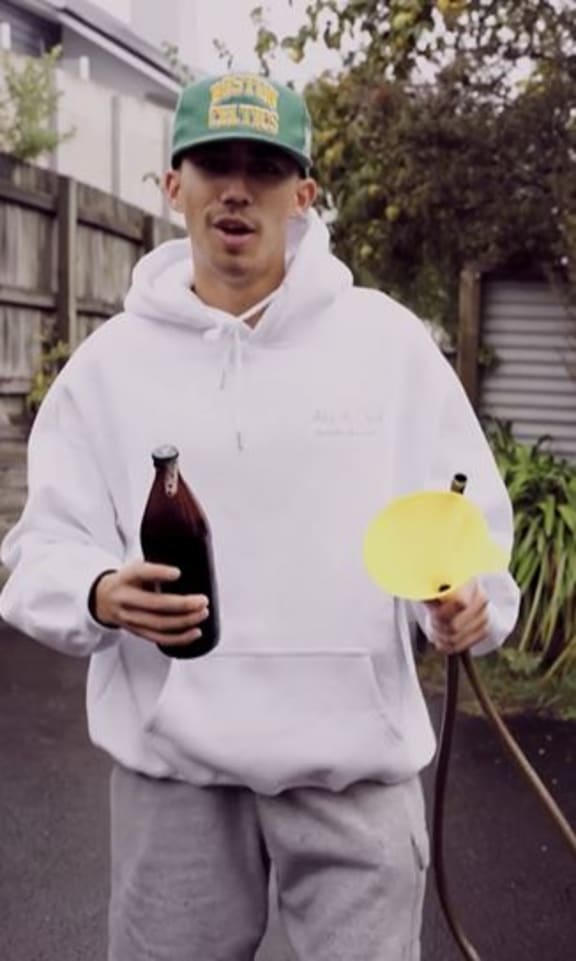
Photo: Instagram/thats_us_nz
While documents state Jensen has ultimate sign-off on all content being produced, she says content decisions were in fact made by Ngati Rangatahi and it "was deliberately edgy as this was part of the overall strategy."
A basic 15 second promotional video for the campaign costs $38,000. (Jensen says someone else managed this video and she can't recall discussions about its cost.)
In a bid to break out of the Waikato base the campaign appears to be focused on, $90,000 is spent on a paid social media 'influencer' campaign promoting the 'That's Us' kaupapa nationally. It hires a specialist influencer company, Socialites, to run the side project.
Thirteen young Māori influencers create 53 pieces of content for Instagram and TikTok between December and March. It's highly successful, with posts reaching more than 722,000 people and attracting 70,000 engagements, such as likes, shares and comments.
It's so successful that the contract is extended for another three months. The Socialites campaign later wins two awards at the 2022 Australasian Social Media Awards for Best Public Service Campaign and Best Social Good awards across New Zealand and Australia.
In total, the paid influencer campaign delivers 73 pieces of unique content for $157,000, equating to $2150 per piece.
In comparison, the rangatahi hired by THH created 79 unique pieces of content, at what appears to have been a cost of up to $481,800, according to documents seen by RNZ. Another $714,000 is spent on consultancy fees and media placement with Aro Media. This equates to $15,126 per piece of content.
Some THH staff baulk at how much some of the rangatahi are being paid. University students or recent graduates are earning between $40 an hour for social media moderation, up to $70 an hour for a co-lead role. A few that are professional designers or video editors earn up to $100 per hour.
"Here were some inexperienced, unqualified students suddenly on a wage equivalent to a senior creative at an advertising agency. Staff felt angry and insulted," a former THH employee familiar with the project says.
Jensen, staff say, is the one who proposes how much the rangatahi should be paid. Notes on procurement documents show executives queried whether they are being paid enough.
Jensen admits she was involved in discussions about rates and "helped frame the rates in respect of the work required", but they were "reviewed and quality assured" by the marketing manager and procurement staff.
"I was not part of any of those formal processes," she says.
Despite the huge budget, however, the rangatahi content doesn't travel nearly as well.
"The rangatahi produced content had very few likes or comments compared to the paid influencer campaign that had huge engagement," a source familiar with the campaign says.
In a bid to increase engagement with the content online, a consultancy firm is hired for $10,000 to produce a social media guide for the rangatahi spelling out how to create content, use hashtags and the optimal times to post in order to attract the most viewers.
There are also workshops and strategy sessions costing thousands.
It doesn't seem to help.
"Content was created by rangatahi off the cuff week to week, without much forward planning and quality control, and the rangatahi consistently made excuses for lack of new content."
Content is repeated on some platforms like YouTube so often, THH receives a complaint from one viewer.
"I am absolutely bombarded by your advertising and it has started to drive me up the wall," the viewer writes.
Suddenly successful
But by April, the campaign is being hailed as a success. A report prepared by Aro Media says posts have achieved 13.6m impressions, reached 1.5m on Facebook and TikTok, had 1.2m engagements and 586,000 video views between February and March after $78,130 is spent promoting the content online.
Impressions are the number of times content appears on a social media feed. Reach is how many people actually see it and engagement is the number of interactions, such as comments, likes and shares.
Another report, given by Covid-19 Response Minister Chris Hipkins in a response to a Parliamentary Written Question a little over a month later, suggests dramatically better results.
Hipkins says, as of the end of May, there's been more than 40 million impressions, 2.93 million engagements and 2.16 million video views.
This suggests the audience for the six-month campaign more than doubled - or on some measures quadrupled - within the space of eight weeks.
There's a reason why.
More than $165,000 is spent promoting the content online in the last three months of the campaign. That's 60 percent of the total paid media budget for the whole campaign.
The spending delivers an audience. By the time it wraps up at the end of June the content has delivered more than 52.8 million impressions.
Former staff familiar with the campaign question why such an "extraordinary" amount is spent when first dose vaccination rates among rangatahi have been sitting at 88 percent since March and 83 percent for second doses. Neither rate has changed since then.
Official investigation
At around the same time Hipkins delivers the updated figures on the campaign's reach, THH is starting an investigation into Jensen. Allegations of potential conflicts of interest have been raised about Jensen's employment at THH.
She's also facing allegations her family and friends were recruited to work on 'That's Us'.
THH appoints Wellington lawyer Joss Opie to investigate any "potential, perceived or actual conflicts of interest".
The scope of Opie's investigation widens further in June after RNZ sends THH evidence that suggests some of the rangatahi hired to work on the campaign may be part of Jensen's whānau and were living with her at the time they were recruited.
The investigation is now complete but citing privacy, Health NZ has declined to release the findings. It has also refused to release copies of all conflict of interest forms signed by Jensen during her employment at THH.
$10k 'onsigning payment'
But documents obtained by RNZ show normal procurement processes were waived by THH for the 'That's Us' project.
"As they are young Māori, many of whom are at the start of their respective careers, or just hitting the scene in their respective industries, none of them are registered government suppliers and unable to be procured through normal government procurement processes," all the rangatahi's contracts state.
Bonilla asks for a $10,000 "onsigning payment" at the start of his full-time $70/hour four-month contract. The payment acknowledges "services provided to get 'That's Us' organically launched."
He is the only rangatahi to make such a request, according to documents seen by RNZ.
What exactly were the services he provided valued at $10,000? Health NZ says it needs several weeks in order to respond to that question.
It's unclear if Bonilla receives this payment, as in the end his contract - only signed on December 6 - is backdated to November 1, incorporating the period he initially asks to be paid for. Many of the contracts were similarly backdated.
Bonilla declined to comment.
Jensen says it is "not uncommon for government contracts to have on-signing payments". Bonilla was not the only one to receive one, she says.
Government procurement rules state an employee has a conflict of interest if, as part of their work duties, they're required to deal with a relative or close personal friend. It is unclear if Jensen or Bonilla declared their relationship, or if they did, how it was managed.
Jensen will not say if she signed a conflict of interest form regarding Bonilla and his partner.
"The conflict of interest was managed through the delegation of sensitive arrangements i.e. contract and procurement processes etc being managed by other managers and staff," she says.
Former THH employees say Jensen talked openly about working with her whānau on the campaign but some were still surprised to discover her nephew and his partner Zooming into campaign meetings from her living room.
Another rangatahi hired for the campaign often worked from Jensen's lounge, while another was "introduced to the team via Zoom, sitting next to Debra, in what appeared to be her bedroom."
It was only after these meetings they realised many of the rangatahi were relatives or friends with Jensen and Ake.
"Staff simply wondered how this was allowed, given we had such stringent procurement processes for all other projects," says a former employee.
Documents show one of the rangatahi involved in the project was given responsibility for managing any conflicts of interest and implementing agreed mitigation strategies, but there's no mention of what these are and the only risk mentioned in any of their contracts is whether they'll be able to manage their workload while studying or juggling other work commitments.
The contract for Bonilla's partner declares a conflict of interest "had been declared during the procurement process, but not the proposal process" and notes Jensen will not be involved in the financial management of her contract as a result.
THH staff working on the campaign queried why nearly all the rangatahi hired were from Waikato and appeared to be whānau or have close links with Jensen, Ake or Bonilla, when it was pitched as a national project using rangatahi from around the country.
"Staff continuously pushed for a nationwide spread of creatives and content. We knew there were thousands of talented rangatahi in New Zealand who would have jumped at the opportunity to be part of a major campaign, and be paid to do so," another former employee says.
"No one listened, especially Debra."
Jensen, however, says "non-Maori THH staff were in place to execute rather than offer their views on the strategic direction of the campaign."
She says many rangatahi were approached to work on the campaign.
"Many of the rangatahi were not available for a range of reasons - some contributed for a while and pulled out. Others supported in other - unpaid - ways.
"Additionally, the establishment of Ngāti Rangatahi and then the recruitment of workers all took place during lockdown. There was tremendous pressure to get something in market, so of course under such constraints, the rangatahi utilised their own networks i.e. approached people they know, to identify potential contributors."
Bonilla was her "only blood relative" involved in the campaign and none of the other rangatahi are whānau, she says.
"The rangatahi that eventually ended up working on the campaign may reside primarily in the Waikato and Auckland however they all have iwi affiliations, and networks across the country. In te ao Māori, where you live does not necessarily reflect your connections and other spheres of influence."
A lot of 'non-standard practices'
RNZ's investigation raises many questions about the 'That's Us' campaign, National's Shane Reti says.
"There's a lot of non-standard practices that have gone on here," Reti says.
"I'm very uncomfortable with the waiving of normal procurement processes, which may well have contributed to part of the mess that we're seeing."
It's also hard to understand how the campaign was paused over summer holidays when it was a key timeframe to get rangatahi vaccinated, he says.
"By the time they kicked off in the beginning of 2022, nearly 90% of the target group had already been vaccinated. What were they doing? And what then became their outcomes if the target had pretty much already been reached?"
The end of 'That's Us'
Jensen was undeterred by the problems with the project.
In April, she put together a bid to make the 'That's Us' a permanent fixture at Te Hiringa Hauora before it was folded into Health New Zealand.
A draft proposal suggests putting 13 rangatahi permanently on staff plus a media budget of $2m a year for the next three years, extending the focus of 'That's Us' from vaccination to "wellbeing".
The proposal concedes there were some initial problems with the campaign but says the strategy is working. Any future issues can be fixed by making the rangatahi permanent employees, it says.
"At project inception we experienced some on-boarding issues which created delays in processing contracts, invoices, payments etc. This combined with low resilience and tolerance for these teething issues meant that we have also cycled through a few rangatahi across the campaign thus far.
"While these problems have since been sorted - this, combined with the speculative nature of the campaign has created some reputation concerns for us and makes it difficult to encourage more long term commitment from other interested rangatahi."
Creating permanent roles would resolve this issue and this should be created before the health reforms take place in July, it argues.
But the bid fails and funding is not renewed. The campaign ends on June 30, with vaccination rates still unmoved from five months earlier.
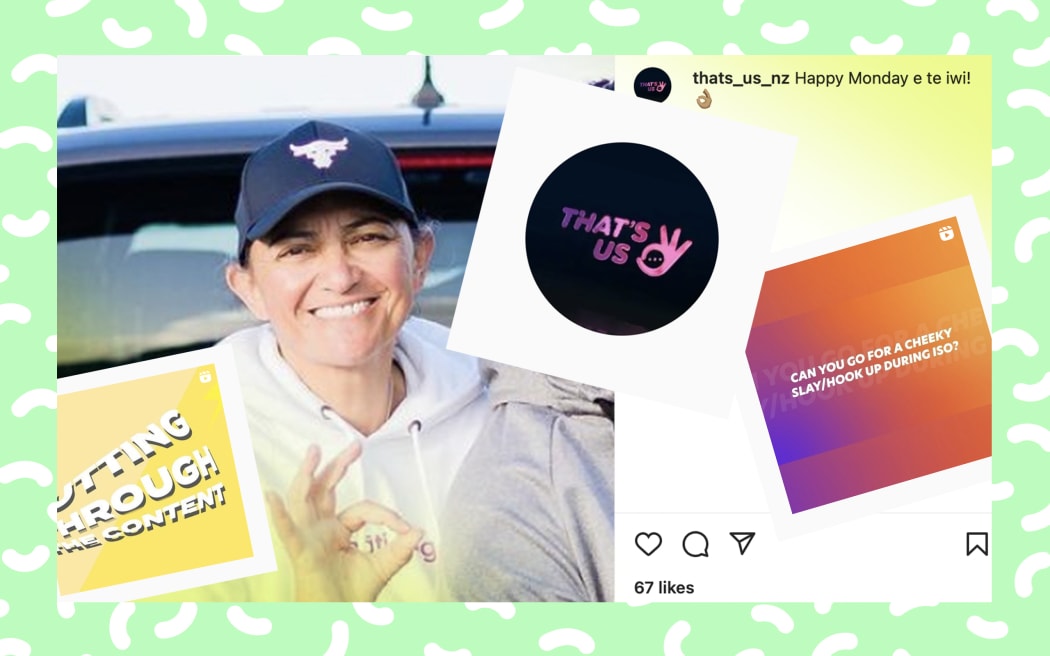
Debra Jensen Photo: RNZ
What counts as "success"?
The campaign's success is not solely based on an "arbitrary review of its performance metrics," Jensen says.
"The campaign is also an achievement in inter-agency relationships and pooling of resource, funding and influence. It is also the realisation of proper co-construction with iwi communication specialists from across the motu.
"Perhaps the most important metric of achievement for this inter-agency coordination was the speed and agility with which the campaign was put into market. It's not uncommon for a campaign of this scope to take 6-12 months of development before anything is live in market.
"Both Karawhiua and That's Us were in market in significantly truncated timeframes i.e. less than 6 months. However this also put undue pressure on staff and the availability of resource."
The campaign was slow to kick off because it took three months for agencies to agree on a contracting model, she says. And the decision to start with organic, rather than paid media posts, was made by Ngati Rangatahi.
"To develop a credible brand and presence with the audience, they believed they needed to start off with an unpaid presence and post their content organically on social media platforms without any boosting of posts etc and without any supplementary advertising on wider digital platforms.
"The rationale was that rangatahi are savvy and can spot government supported campaigns very quickly and tune-out. The decision was not well understood by all staff.
"As this was going to be a rangatahi led campaign, then on fundamental decisions like this we had to allow the exercise of that leadership even if it was against normal practice.
"We worked in an environment where it was an accepted truth that standardised and normal approaches to health promotion do not address inequity in health service delivery. As such, experimentation was encouraged."
Health NZ responds
Health NZ says it will be undertaking an evaluation of the Ngati Rangatahi 'That's Us' campaign next year.
It declined to be interviewed and did not answer written questions. In a broad statement attributed to an unnamed individual it said the Health Promotion Agency/Te Hiringa Hauora ceased operating on July 1 and is now part of the National Public Health Service at Te Whatu Ora/Health New Zealand.
"As part of the process of establishing Te Whatu Ora, we are looking at how contracts across all former DHBs and shared services are managed in the most effective way to benefit New Zealanders.
"This means we are taking a different approach to how we manage all such contracts under our governance now and into the future. As such, we will not be following the process that was used at the time for this particular campaign.
"That said, Te Whatu Ora acknowledges the concerns that have been raised. We take all such matters seriously and conduct investigations as appropriate.
"The claims made about individual staff involved in the campaign and alleged conflicts of interest have been thoroughly investigated as part of an employment process. As such, and in keeping with our legal obligations as an employer, our position remains that such matters are confidential between Te Whatu Ora and its employees. This obligation remains even after an individual is no longer an employee and/or the employment process has ended."
'That's Us' was just one of several initiatives aimed at increasing Covid-19 vaccination rates among Maori and Pasifika, it said.
"From 1 November 2021 to 1 July 2022, the proportion of eligible rangatahi Māori aged 12-29 who received two vaccine doses rose from 56 to 83 percent, which is an additional 62,859 young Māori double-vaccinated over this period.
"Over this time, the gap between vaccination rates for young Māori as compared with all ethnicities aged 12-29 narrowed significantly, reducing from 20 percent as of 1 November, to 7.5 percent by 1 July 2022.
"The campaign had a strong strategic focus on building interest, relevance, trust, confidence and engagement among rangatahi Māori about vaccinations to promote increased uptake.
"We also acknowledge the mahi done by all of the rangatahi involved in the campaign.
"Given the objectives of the vaccination programme are to encourage as many people as possible to be vaccinated by using all of the relevant tools available and to ensure greater equity of access among Māori, targeted campaigns such as 'That's Us' that are designed by Māori for Māori are consistent with that goal and reflect the 'whānau-centred' approach that is at the heart of the roll-out programme," the statement said.
The Ombudsman is investigating Health NZ's refusal to release the investigation findings, terms of reference and other documents requested by RNZ under the OIA.
Jensen resigned from Te Whatu Ora on 2 December.

